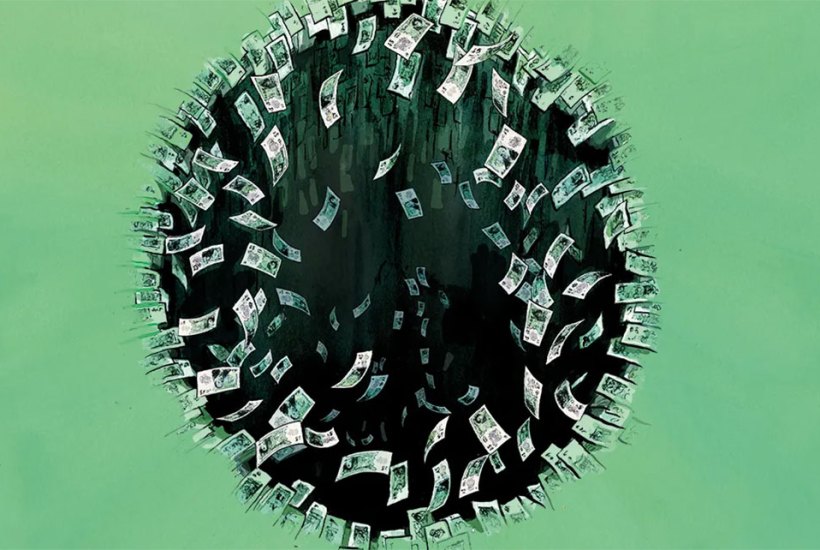What’s the point?
Sir: Your editorial (‘Net loss’, 2 March) sets out how the decarbonisation industry is a net drain on the British economy. While you mention that the UK has already decarbonised faster than any other European country, the fact that the UK produces less than 1 per cent of global carbon emissions to start with means that even if we became carbon neutral overnight, it would have precisely no impact on global climate change. So the 765,000 people working in that sector are not only taking skilled labour away from sectors that are actually economically productive, but they are on a hiding to virtue-signalling nothing. They might as well be digging holes and filling them in again.
Lewis Feilder
London SW6
The taste of Mayo
Sir: Lord Sumption, in his review of Remembering Peasants (Books, 24 February), asserts that ‘modern Ireland is immeasurably happier for having confined its peasants to museums’. My mother would disagree. She was raised on a smallholding of rugged and rocky land in a tiny village on the western seaboard in Co. Mayo. She was the youngest of ten, and her memories are far from miserable. In the summer, manual labour was rewarded with the pleasurable feeling that comes from physical activity and working with the source of life. In winter, the neighbours would call round and join in with games and festivities.
And today? The lucky ones in the city work in sedentary office jobs and go to the gym in the evening. The unlucky ones – the majority – struggle along in a new type of subsistence, doing menial jobs but without the fresh air, exposure to nature and community of times past.
I have great respect for Lord Sumption, but I think here he emphasises collective material progress over individual experience – where life, after all, is lived.
Columb O’Donnell
Dublin
Pause the applause
Sir: Ysenda Maxtone Graham is quite right about the unsuitability of applause at funerals (‘Sad Clappies’, 2 March), and also after such works as Bach’s St Matthew Passion. However, for more joyful pieces it is another matter. I well remember a performance of Britten’s Spring Symphony at the Three Choirs Festival in 1970, when for the first time at a concert in Hereford Cathedral the audience applauded the joyous music. The elderly lady sitting next to me rapped her umbrella on the floor in disapproval at what she felt to be an unseemly outburst – a gesture taken by most people as her way of showing her approval.
Cessa Moore
Hereford
Choose shrews
Sir: Dot Wordsworth’s ‘Pronouncing places’ article (Mind your language, 24 February) reminded me of the nearby town of Shrewsbury. The people who live there pronounce it shrews – like the small furry mammal – whereas outsiders seem to prefer shrows. The argument has raged for years with no signs of the question ever being settled, despite a survey showing that the majority agree shrews is correct.
Emily Symmonds
Shropshire
Diversity issues
Sir: It’s honest of Niall Ferguson to admit that his support of Israeli actions in Gaza is ‘unfashionable’ (Diary, 2 March). Clearly opinion in the UK and USA is swinging in favour of Palestinians. The Spectator is usually interesting in its diversity of minority views, which is why I enjoy it.
Andrew Levens
Swindon, Wilts
Free degrees
Sir: I was amused to see Niall Ferguson refer to the ‘enduring value of sociology’ in last week’s diary. I tend to agree with the view of Rod Liddle – a sociology graduate – a few weeks ago that it was a waste of energy. At university in the 1970s there was a sign above the loo-roll holder saying: ‘Sociology degrees – please take one.’
Christian Stevens
Faversham, Kent
Unknown country
Sir: In her column last week, Katy Balls dealt with the particular concerns of rural constituencies and the need for their MPs to have a sound command of topical countryside issues. I recall a story going back to a general election many decades ago concerning one of the candidates in a Scottish rural seat. At a public meeting during the election campaign, the candidate was asked by a local farmer what he thought of fallow fields. Without any hesitation, he replied that in his opinion it was one of John Buchan’s best books.
Richard Symington
London SW17
Screen test
Sir: I’m as exasperated as Rod Liddle at cinema’s obsession with stereotypes (‘How to write a modern screenplay’, 2 March). Just the other day I too groaned at a middle-aged white man pathetically reliant on a woman to save him, whose marriage was ‘founded on lies’, whereas the black character was ‘on the side of angels’, while money-making at the expense of others was obviously evil. Plus, all the baddies were white men. Having said all that, I must admit that Casablanca was rather good.
Grant Feller
London W4
Wren will I see you again?
Sir: Matt Ridley’s article on the decline in willow tits on his farm (‘Bird brains’, 2 March) prompts me to pose a similar question. I live in the countryside and it is years since I saw a wren. I don’t think it’s failing eyesight. Are badgers the culprit or is it foxes?
Richard Mays
East Grinstead, West Sussex
Got something to add? Join the discussion and comment below.
Get 10 issues for just $10
Subscribe to The Spectator Australia today for the next 10 magazine issues, plus full online access, for just $10.
You might disagree with half of it, but you’ll enjoy reading all of it. Try your first month for free, then just $2 a week for the remainder of your first year.








Comments
Don't miss out
Join the conversation with other Spectator Australia readers. Subscribe to leave a comment.
SUBSCRIBEAlready a subscriber? Log in